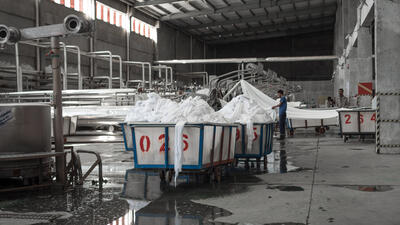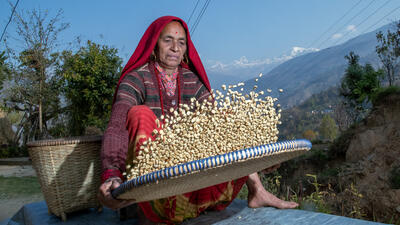Commodities, competitiveness and innovation in the supply chain (en)
At ‘Innovations Along the Supply Chain: can smallholder producers ever succeed in the export supply chain’, ITC’s Rob Skidmore, the session’s moderator, set the stage for the debate by pointing out that more than one billion people rely on smallholders for their daily food.
Dr Mohammed Razzaque, an Economic Adviser with the Commonwealth Secretariat, said that there is significant scope for developing regional supply chains, which in turn can promote regional competitiveness. He also argued that supply chains can actually be ‘pre-poor’ when small producers are integrated effectively in the process.
Using the example of Indonesia’s MP3EI Master Plan, which seeks to accelerate and expand the country’s economic development and has the food industry as one of its key economic activities, Mr Adhi Lukman, Chairman of the Indonesian Food and Beverages Association, argued that infrastructure is central to integrating smallholders in the global supply chain, adding that governments, the private sector and development partners should do more to support smallholders.
Mr Lukman receieved backing from Mr Alioune Sarr, General Director of the Senegalese Export Agency, who said that one of the biggest problems of his country’s mango production is poor infrastructure. Focused in Senegal’s rural communities, post-harvest losses of between 5%-10% are down to insufficient infrastructure, he said.
Meanwhile, Mr Gulam Patel, Chairman of Zambia-based Nyiombo Investments, described how Zambia has for the past 45 years experimented with various schemes to bring smallholders out of subsistence farming with little success. Now though, he said, government-backed programme subsidizing supplies of seeds and fertilizer has shown results, increasing the production of maize from 800,000 tons to 3 million tons, including a surplus for export.
Participants at the parallel session on ‘Ensuring Competitiveness Through Targeted Support Services for the Private Sector’ hear panellist discuss how trade support institutions in rural areas are at disadvantage as they often lack the basic resources needed to provide support for their clients.
The panellists concluded that, for rural-based SMEs to become export ready, it is important for them to understand buyer requirements, first at the domestic market level, then at the regional and eventually at the international level. Connection is required between SMEs themselves, between TSIs and between TSIs and TPOs, and with policymakers, to ensure they take account of the needs of rural based SMEs, and as a result there is marked improvement in terms of their access to finance, trade intelligence and availability of affordable business support services.
Before targeting regional and international markets, it is important to promote local sourcing to support small rural based SMEs. They need to be provided with all relevant information, products and services to help them to comply with domestic market requirements. Backward linkages between the agriculture sector and the tourism sector should also be developed.
What role for commodities markets?
The third parallel session this morning at WEDF, ‘Organizing the Commodities Markets: the role of large corporations, large commodity traders and commodity exchanges’, looked at how to organize the commodity markets more effectively, but the panellist also sought to identify success stories.
They found common ground on several issues. Cooperation between small and larger traders, and producers, for example, is important to ensure a health growth of the commodity markets – especially in commodity-based developing countries. However, a big challenge for the future is how to create more effective commodity exchange, as is the problem of how to deal with different domestic and international prices. Small-scale farmers in particular suffer from price volatility. Dr Eleni Gabre-Madhin, founder and former CEO of the Ehtiopia Commodity Exchange, said that for this to happen, it is important to secure political will and government support.
Read the full summary of Innovations Along the Supply Chain: can smallholder producers ever succeed in the export supply chain.
Read the full summary of Ensuring Competitiveness Through Targeted Support Services for the Private Sector.
Read the full summary of Organizing the Commodities Markets: the role of large corporations, large commodity traders and commodity exchanges.















